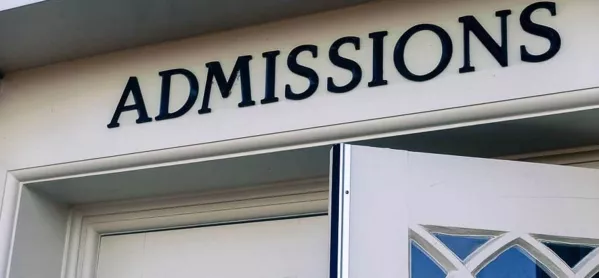Today’s annual report from the Office of the Schools Adjudictor contains a wealth of information about trends in school admissions.
Here are 12 key nuggets from the document:
- More councils questioning admission arrangements of local schools...
The report says 81 local authorities said they had queried at least one set of arrangements, compared to 63 in the previous year. The schools adjudicator welcomes this increased scrutiny.
- ...but the increasing number of admission authorities is leaving councils struggling
With increasing numbers of schools becoming academies, some councils are struggling to scrutinise the growing number of admission arrangements in their area.
The report cites one council with more than 200 admission authorities in its area which “said that simply collecting the arrangements was a challenge with some schools requiring six or more contacts before determined arrangements were provided”.
- Objections to admission arrangements halve
The number of new objections to admissions arrangements fell by 50 per cent, from 200 received in 2015-16 to 100 in 2016-17. Two thirds were about academies and free schools.
The report says: “Of the new cases, 15 concerned the admission arrangements for 14 community and voluntary controlled schools, 11 for 11 voluntary aided schools, six for four foundation schools and 68 for 62 academy schools, including free schools.”
The adjudicator upheld or partially upheld 41 objections.
- Concerns about new academies
The report says that when some schools became academies their admission arrangements were “unclear or incomplete” because they used out of date links to information on the local authority website.
It adds: “In other cases, arrangements lacked key information, such as that concerning out of normal age group admissions and, for children below compulsory school age, the rights to deferred entry and part-time attendance, required by the Code.”
- Objections to grammar schools rise
In a year when grammar schools were in the political spotlight, the number of objections to fully and partially-selective schools rose. Some centred on whether the admission tests were “a true test… of ability”, fair, or disadvantaged particular groups.
The adjudicator found that most “tests and test arrangements were compliant with the Code”, but in one local authority area which attracted a series of objections the admission authorities had already started changing their testing arrangements.
- Surge in requests to defer entry for summer born children
Parents have the right to ask for a child born between 1 April and 31 August to defer their entry into reception until the September after their fifth birthday.
A total of 31 councils said increasing numbers of parents were asking for this, with one saying the number of requests had tripled in the last three years.
However, the report highlights “extreme concern” that “many admission authorities are failing to make clear the rights parents do have to ask for deferred entry”.
- Places without a catchment area
Some children have “little priority for a place at any school” because their areas are not included in any catchment area, as the area had not historically included any housing. The report cites the example of houses built on a former army range.
- Impact of feeder school decisions on journey times for children
Adjudicators upheld some objections to the inclusion of feeder schools in secondary school admission policies “on the grounds that the arrangements were not fair to children who had not attended the feeder schools”.
It added: “If the giving of priority by a secondary school to children from certain feeder primaries means that other children will face a significantly longer or more difficult journey to different schools as a result, then the arrangements are likely to be found to be unfair.”
- Councils failing to consult parents properly
Councils are required to consult on their arrangements when a change is proposed, or at least once every seven years. However, the report says that nearly 30 local authorities “thought that putting material on their website is sufficient consultation”. The report says that doing nothing else to bring it to the attention to parents is “not enough”.
Not many schools use pupil premium in oversubscription criteria
- Only 179 schools are reported as using the pupil premium in their oversubscription criteria, despite 2018 being the third year in which all schools were allowed to do so. 60 used the early years premium, and 185 the service premium.
The report says 93 of the 163 grammar schools use at least one of these premiums, while other grammars have a set number of places for pupil premium-eligible pupils who met the standard, or set a lower pass mark for them.
Local authorities said the most common reasons for not using such premiums included fears that it could displace children living near the school, and further disadvantaging families who were entitled to free school meals but did not apply for them.
- Suggestion for dealing with siblings
The report recognises the difficulty schools face striking a balance between giving high priority to siblings, and the needs of first born or only children to attend a local school.
It says: “An approach which works well in many situations is to give priority to in catchment siblings, then other catchment children, then out of catchment siblings and finally other children.”
- Praise for Catholic Education Service
In 2015, the Catholic Education Service encouraged its schools to move from a system based on diocesan priests’ references to a national system of a Certificate of Catholic Practice (CCP). The report says that, following that findings that the system was “not sufficiently clear or objective”, the service drew up a definition of what is required in terms of religious practice.
The report praises this as “written in clear and straightforward language”, and says “Catholic schools using the CCP with the accompanying definition and explanation are striving to meet the Code’s requirements”.
